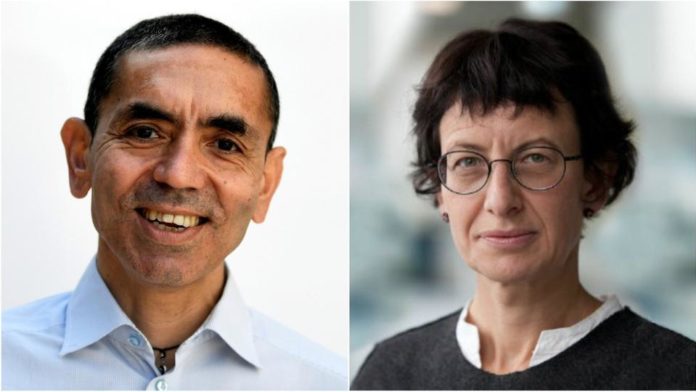Turkish Migrants, Husband And Wife Team, Behind Pfizer’s COVID-19 Vaccine

NEW YORK (VINnews) — When pharmaceutical giant Pfizer announced this week that early data from its vaccine showed a more than 90% success rate, little was known of the developers of the vaccine who had collaborated with Pfizer on the novel vaccine which may help end the global pandemic in the near future.
Pfizer and BioNTech, the German-based biotech company which joined forces with Pfizer to develop the vaccine, are the first drugmakers to show successful data from a large-scale clinical trial of a coronavirus vaccine. The companies said they have so far found no serious safety concerns and expect to seek U.S. emergency use authorization later this month, although widespread use will take a few more months.
National Post reports that the innovators of the vaccine are a modest husband and wife team, both of them from migrant Turkish families in Germany: Ugur Sahin, 55 and Oezlem Tuereci, 53. The two oncologists, founders of BioNTech, achieved their initial success in cancer immunotherapy but quickly realized that the same methods used to target the problem cell in cancer could prove highly effective in combatting coronavirus.
Sahin, the son of a Turkish immigrant who worked at Cologne’s Ford factory, pursued his childhood dream of studying medicine and became a doctor and academic. He taught at hospitals in Cologne and in the southwestern city of Homburg, where he met Tuereci, the daughter of a Turkish physician who had migrated to Germany, early in his career.
The two found a common bond in medical research and oncology and were so driven to succeed in their field that Tuereci said in a media interview that even on the day of their wedding, both found time for lab work. The two have one daughter from their marriage.
Their first entrepeneurial venture was Ganymed Pharmaceuticals, whose goal was to develop cancer-fighting antibodies. The company successfully canvassed for funding from MIG AG as well as from Thomas and Andreas Struengmann, who sold their generic drugs business Hexal to Novartis in 2005. Eventually the company was sold to Japan’s Astellas in 2016 for up to $1.4 billion, but by then the couple were heavily involved in their next venture, BioNTech, founded in 2008 to pursue a much broader range of cancer immunotherapy tools.
Despite his business pursuits, Sahin maintained his academic career, holding a prestigious professorship at Mainz University, but neither academic advancement nor financial success changed the humble professor’s habits. Matthias Kromayer, a board member of venture capital firm MIG AG, whose funds have backed BioNTech since its inception in 2008, says that Sahin, the CEO of a large biotech company, would typically walk into business meetings wearing jeans and carrying his signature bicycle helmet and backpack with him.
In January 2020, Sahin came across a scientific paper on a new coronavirus outbreak in the Chinese city of Wuhan and it struck him how small the step was from anti-cancer mRNA drugs to mRNA-based viral vaccines.
BioNTech quickly assigned about 500 staff to work on several possible compounds, winning pharma giant Pfizer and Chinese drugmaker Fosun as partners in March. The move paid of handsomely, as the team managed to be the first to initiate a large-scale trial of an experimental vaccine in July.
The vaccine uses a never-before-approved technology called messenger RNA, or mRNA, to produce an immune response in people who are vaccinated. The mRNA vaccine approach uses genetic material called mRNA to trick cells into producing bits of protein that look like pieces of the virus. The immune system learns to recognize and attack those bits and, in theory, would react fast to any actual infection.
The markets responded strongly to the new vaccine, raising BioNTech’s value from $4.6 billion a year ago to S21 billion as of Friday’s close. Pfizer announced that it plans to produce 50 million vaccines this year and a projected 1.3 billion more in the coming year
Matthias Theobald, a fellow oncology professor at Mainz university who has worked with Sahin for 20 years, said his tendency towards understatement belies a relentless ambition to transform medicine, exemplified by the leap of faith to a COVID-19 vaccine.
“He is a very modest and humble person. Appearances mean little to him. But he wants to create the structures that allow him to realize his visions and that’s where his aspirations are far from modest,” Theobald said.
Sahin told Reuters Monday that he did not know earlier in the year how difficult the task overall would be.
“It’s certainly not something that you would easily voice as a serious scientist, but it was within the realms of possibility from the beginning.”



